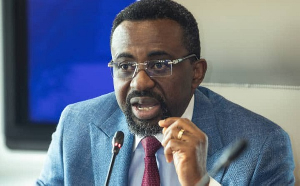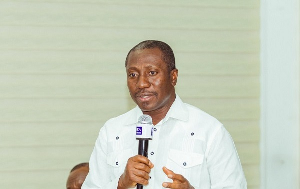Speaker of Parliament Alban Bagbin says it will require more time for the house to be able to examine budgetary information.
He said that Parliament lacks the ability to independently examine budgetary information in such a short time frame available to the house for approval of the budget.
Speaking at a forum for the lawmakers in Ho over the weekend to discuss the 2021 budget statement, the problem is a result of several constitutional, legal and institutional weaknesses.
“Parliament as presently constituted lacks the ability to independently analyses budgetary information in such short time frame available to the house.
“It is not because members of have no such capacity but that parliament is constrained by several constitutional, legal and institutional weaknesses.
“International best practice recommends that a minimum of three to four months is required for the approval of a budget by the legislature and that approval is to be based on meaningful analysis and scrutiny,” he said.
Majority Leader Osei Kyei-Mensah-Bonsu said that the Akufo-Addo-led administration will ensure that the local economy becomes stringer and better after the effects of the coronavirus pandemic.
He said the pandemic has created sever problems for the economy but with the right polices and flagship programmes introduced by the government these difficulties will be dealt with.
Speaking at a forum he said “Our collective efforts to wither the impact of the Covid pandemic has largely been successful and we are ready to soldier on to build back stronger and better.
“In this regard we will continue our investments in our major flagships, invest in the real sector to drive growth , accelerate the industrialisation and transformation of our economy.”
For his part, Minority Leader Haruna Iddrisu said the budget statement for the 2021 fiscal year has no provision for the Ghanaian workers, Rather, he noted, the budget is intending to make life difficult for workers following the introduction of the new taxes.
He said at the same forum that “Two important taxes are for my attention. One, sanitation and pollution tax. But Mr Speaker, we have a duty as a parliament to work with the executive for the economy of Ghana to recover. That should be the challenge as we speak today.
“What do we do post Covid Ghana in order that we can generate economic and investment opportunities that will spur growth for the Ghanaian enterprise and provide opportunities to address the growing unemployment in our country.”
The Tamale South MP added “The workers of Ghana do not know what they fate is in this 2021 budget because minimum wage and public sector wages have not been determined and conclusively negotiated and determined.
“So whatever numbers you have for compensation budget is likely to grow and is likely to erode any gains that may be made.”
The government is proposing in the 2021 budget statement the introduction of a Covid-19 Health Levy of a one percentage point increase in the National Health Insurance Levy and a one percentage point increase in the VAT Flat Rate to support expenditures related to Covid-19.
“To provide the requisite resources to address these challenges and fund these activities, government is proposing the introduction of a Covid-19 Health Levy of a one percentage point increase in the National Health Insurance Levy and a one percentage point increase in the VAT Flat Rate to support expenditures related to Covid-19,” the budget statement presented by the leader of Government Business, Osei Kyei Mensah Bonsu said among other things on Friday March 12.
It added that “to leverage other resources to fight the pandemic, Government passed the COVID-19 National Trust Fund Act, (2020), Act 1013 in April, 2020 to establish the Fund. As at 31st December, 2020, the Fund had mobilised GH¢ 57,134,093.58 of which GH¢45,218,313.23 had been utilized.
“These resources complemented Government efforts in providing PPEs and medical supplies to COVID-19 selected institutions, distribution of food items to the aged, vulnerable, and needy persons; providing vehicles to selected Treatment Centres, National Public Health & Reference Laboratories, Testing Centres, and the COVID-19 Central Care Management Team. It also supported the construction of the National Infectious Disease Centre.”
General News of Tuesday, 16 March 2021
Source: ghanaguardian.com
Parliament needs more time to examine budgetary information – Bagbin
Entertainment












